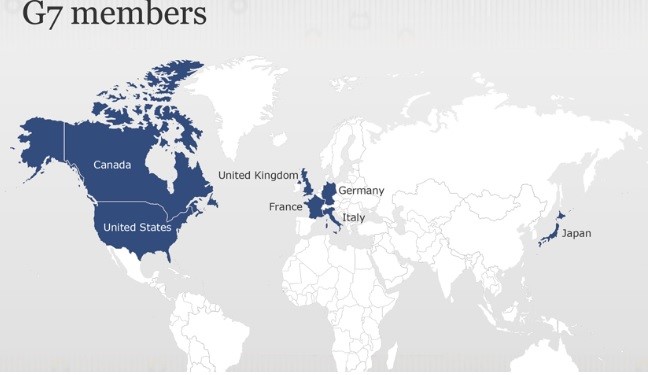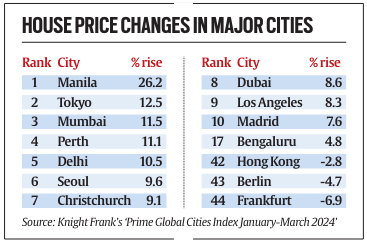14 June 2024 : Daily Current Affairs
1. G7 Leaders Agree on $50 Billion Loan Plan for Ukraine Using Frozen Russian Assets
(Source: Indian Express; Section: The World)
| Topic: GS2 – International Relations |
| Context: |
|
Analysis of News:

Security Accords and Financial Support:
- On the sidelines of the summit, Zelenskiy signed a 10-year security accord with Japan, committing $4.5 billion in aid to Ukraine for the current year.
- Additionally, Zelenskiy is set to sign a long-term security agreement with US President Joe Biden.
- The G7’s plan involves a multi-year loan scheme utilizing profits from approximately $300 billion of impounded Russian funds, with technical details to be finalized in the coming weeks.
U.S. Commitment and Broader Participation:
- The United States has pledged up to $50 billion in support, although this figure may decrease as other countries contribute.
- The aim is to ensure sustained financial support for Ukraine regardless of political changes within G7 member states.
- This approach addresses concerns that a potential US administration under Republican presidential candidate Donald Trump might be less supportive of Kyiv.
Russian Response and Summit Dynamics:
- Russia has condemned the West’s efforts to utilize income from its frozen assets, labeling such actions as criminal.
- Foreign ministry spokeswoman Maria Zakharova warned that Moscow’s response would be particularly severe for the European Union.
- Italian Prime Minister Giorgia Meloni expressed optimism that the summit discussions would yield concrete and measurable outcomes.
Additional Global Concerns:
- The G7 leaders also addressed the volatile situation on the Israel-Lebanon border and supported US efforts to broker a ceasefire in the Gaza war.
- They called on Israel to avoid a full-scale offensive in Rafah, emphasizing adherence to international law.
- Additionally, the leaders shared unanimous concerns over China’s industrial overcapacity, which they argue distorts global markets.
- They also underscored their commitment to aiding African nations in developing their economies.
Inclusive Summit Participation:
- This year’s G7 summit included a broad range of participants, reflecting its inclusive approach.
- Among the invitees were leaders from major regional powers such as India, Brazil, Argentina, Turkey, Algeria, and Kenya.
- The summit also featured a keynote speech by the pope, focusing on the risks and potential of Artificial Intelligence.
Conclusion:
- The G7 summit’s agreements and discussions underscore the group’s commitment to addressing global crises, supporting Ukraine amidst ongoing conflict, and tackling broader geopolitical and economic challenges.
- The involvement of diverse global leaders highlights the interconnected nature of these issues and the need for collaborative solutions.
| PYQ: In which one of the following groups are all the four countries members of G20? (2020) (a) Argentina, Mexico, South Africa and Turkey (b) Australia, Canada, Malaysia and New Zealand (c) Brazil, Iran, Saudi Arabia and Vietnam (d) Indonesia, Japan, Singapore and South Korea Ans: (a) |
| Practice Question: Examine the recent agreement by the G7 leaders to provide $50 billion in loans to Ukraine using interest from frozen Russian sovereign assets. How does this move align with broader G7 objectives and what challenges might arise in implementing this plan? (250 words/15 m) |
2. NTA to Re-conduct NEET-UG for 1,563 Candidates on June 23 Following Exam Disruptions
Source: Indian Express; Section: Explained
| Topic: GS2 – Social Justice – Education |
| Context: |
|
Analysis of News:
Reasons for Awarding Grace Marks:
- Post-exam, many candidates filed writ petitions before the High Courts of Punjab & Haryana, Delhi, and Chhattisgarh, alleging insufficient time to complete the exam due to delays in specific centers.
- The Grievance Redressal Committee (GRC) of the NTA found these claims valid and recommended compensating the affected candidates using a normalisation formula approved by the Supreme Court in a similar case in 2018.
- This led to the awarding of grace marks to 1,563 candidates, with six scoring a perfect 720/720, causing controversy and further complaints.
High-Powered Committee’s Recommendations:
- A High-Powered Committee (HPC) was established by the Ministry of Education and NTA to review the results of the affected candidates. Comprising senior experts, the HPC recommended canceling the normalised scores and offering the candidates a re-examination.
- Candidates opting out of the retest would retain their original scores without grace marks, while those who retake the exam would have their previous scores invalidated. The NTA accepted these recommendations.
Rationale Behind the Recommendations:
- The HPC highlighted that the GRC’s use of the normalisation formula was flawed because it did not account for the specific nature of OMR-based exams like NEET-UG, which lack automated systems for time assessment.
- The determination of lost time based on invigilators’ reports and CCTV footage was deemed inconsistent.
- Additionally, the compensation method did not adequately consider only unattempted questions, resulting in disproportionately high scores for some candidates. Thus, the HPC concluded that a retest would be the fairest solution.
Next Steps and Future Measures:
- The NTA will conduct the retest for the 1,563 candidates and any others directed by court orders. Affected students will receive official communication via email, and new admit cards will be issued.
- The results of the retest are expected by June 30. Moving forward, the NTA plans to start the NEET-UG registration process earlier and enhance the training for invigilators to prevent future delays.
- This proactive approach aims to ensure smoother conduct of exams and avoid similar issues in the future.
| About National Eligibility cum Entrance Test (NEET) |
About National Testing Agency (NTA)
Functions: Conducting Exams:
|
| Practice Question: Discuss the implications of the NTA’s decision to re-conduct the NEET-UG due to exam disruptions. Evaluate the effectiveness of the measures taken by the NTA and the High-Powered Committee in addressing the grievances of the affected candidates. How can such issues be prevented in future examinations? (250 words/15 m) |
3. Rapid, diagnostic test for UTIs may help stem super bug crisis
(Source – The Hindu, International Edition – Page No. – 7)
| Topic: GS2 – Social Justice – Health |
| Context |
|
Analysis of the news:
- The £8 million Longitude Prize on Antimicrobial Resistance (AMR) was awarded to the PA-100 AST System from Sysmex Astrego for its innovative rapid, point-of-care test for Urinary Tract Infections (UTIs).
- The prize, first announced in 2014, aims to combat antimicrobial resistance by encouraging the development of rapid diagnostic tests.
- The PA-100 AST System performs phenotypic testing to identify bacteria causing UTIs and determines antibiotic susceptibility within 45 minutes.
- This technology uses a smartphone-sized cartridge and a shoe box-sized reader to analyze urine samples, providing quick and accurate results.
- The test helps doctors prescribe the right antibiotic at the right time, reducing the need for empirical antibiotic prescriptions.
- Rapid diagnostics are crucial in rational antibiotic use, essential for saving lives and combating the superbug crisis.
- Current tests either provide quick but inaccurate results (urine dipstick) or accurate results that take 2-3 days (urine culture).
- Antibiotic-resistant infections killed nearly 1.3 million people globally in 2019, projected to rise to 10 million deaths annually by 2050.
- The Longitude Prize seeks to replace slow lab tests and reduce “just in case” antibiotic prescriptions, slowing the spread of antibiotic resistance.
- The initiative brings hope for a future with improved infection management and reduced healthcare burdens, especially in countries like India.
| What is Antimicrobial Resistance (AMR)? |
|
Superbugs:
Antimicrobial Resistance (AMR):
|
| PYQ: Can overuse and the availability of antibiotics without doctor’s prescription, the contributors to the emergence of drug-resistant diseases in India? What are the available mechanisms for monitoring and control? Critically discuss the various issues involved. (200 words/12.5m) (UPSC CSE (M) GS-3 2014) |
| Practice Question: Discuss the implications of antimicrobial resistance (AMR) and the emergence of superbugs on global health. How can innovations like rapid diagnostic tests contribute to mitigating this crisis? (250 Words /15 marks) |
4. European Union’s new AI rules ignite battle over data transparency
(Source – The Hindu, International Edition – Page No. – 13)
| Topic: GS2 – International Relations – Effect of policies and politics of developed countries on India’s interests |
| Context |
|
Analysis of the news:
- The EU’s new AI laws mandate transparency about data used to train AI systems, challenging one of the industry’s key secrets.
- Since the launch of ChatGPT by OpenAI, there has been increased public and investment interest in generative AI, which creates text, images, and audio.
- Concerns have arisen over whether AI companies’ use of copyrighted materials, like books and movies, without permission violates copyright laws.
- The AI Act will be phased in over the next two years, allowing time for regulators and businesses to adapt.
- The Act requires organizations using general-purpose AI models, such as ChatGPT, to provide detailed summaries of their training data.
- The AI Office plans to release a reporting template for organizations in early 2025.
- AI companies are reluctant to disclose their training datasets, considering them trade secrets that could advantage competitors.
- The level of detail required in transparency reports will significantly impact both startups and major tech firms like Google and Meta.
- Legal disputes have arisen, with companies like Google, OpenAI, and Stability AI facing lawsuits over allegedly improper data use for training models.
- In the US, President Biden’s executive orders address AI security risks but not copyright issues, though bipartisan support exists for compensating rights holders.
- Tech firms have made content-licensing deals with media outlets to mitigate scrutiny, including OpenAI with the Financial Times and Google with NewsCorp and Reddit.
- OpenAI faced criticism for using an AI-generated voice similar to Scarlett Johansson’s in a demonstration, highlighting transparency issues.
- Hugging Face co-founder Thomas Wolf supports transparency, but accepts that industry consensus is lacking.
- European lawmakers are divided; some, like Dragos Tudorache, believe datasets should be public to allow creators to identify their work in AI training.
- The AI Act seeks to balance trade secret protection with copyright holders’ rights.
- The French government, under President Macron, opposes rules that might limit European AI startups’ competitiveness.
- French finance minister Bruno Le Maire emphasised the need for innovation before regulation to ensure effective governance of new technologies.
| PYQ: Introduce the concept of Artificial Intelligence (AI). How does AI help clinical diagnosis? Do you perceive any threat to privacy of the individual in the use of Al in healthcare? (150 words/10m) (UPSC CSE (M) GS-3 2023) |
| Practice Question: Discuss the implications of the European Union’s new AI Act on transparency and copyright in the development of artificial intelligence. How can these regulations impact innovation, competitiveness, and the protection of intellectual property rights globally? (250 Words /15 marks) |
PRELIMS FACTS
1. Mumbai and Delhi Among Top Global Cities for Prime Residential Price Surge in Early 2024
| Context: |
|
Analysis of News:

Mumbai’s Notable Growth:
- Mumbai recorded a substantial rise in its prime residential prices, with an 11.5% year-on-year (YoY) increase.
- This impressive growth placed Mumbai in the third position globally for the highest YoY growth in prime residential prices during the January-March 2024 quarter.
- This is a significant leap from its sixth position in the same quarter of the previous year.
- The Knight Frank report, titled ‘Prime Global Cities Index January-March 2024’, attributes this rise to robust economic conditions and high demand for luxury homes.
Economic Factors Driving Growth
- The surge in house prices in Mumbai and Delhi can be attributed to strong economic growth, with annual GDP growth rates exceeding 8%.
- This economic resilience has bolstered demand for prime residential properties in these cities.
2. India-made TB diagnostics tech wins acclaim at World Health Assembly
(Source – The Hindu, International Edition – Page No. – 7)
| Context |
|
Analysis of the news:
- Truenat, a rapid molecular test for diagnosing TB, was developed by Goa-based Molbio.
- It was launched in 2017 and is a portable, battery-operated real-time quantitative micro-PCR system.
- Truenat can deliver results in less than an hour and test for over 40 diseases.
- The 77th World Health Assembly in Geneva praised Truenat for its role in combating TB.
- The Global Fund highlighted India’s TB elimination efforts, including the use of Truenat and handheld X-ray devices, as global models.
- Sriram Natarajan, CEO of Molbio, noted that Truenat has about 10,000 installations worldwide, improving case detection.
- In India, Truenat is used at over 7,000 primary and community health centres and 1,500 private labs.
- Union Health Secretary Apurva Chandra urged The Global Fund to continue supporting TB programme efforts.
- TB causes about 480,000 deaths annually in India, contributing to 27% of the global TB burden.




